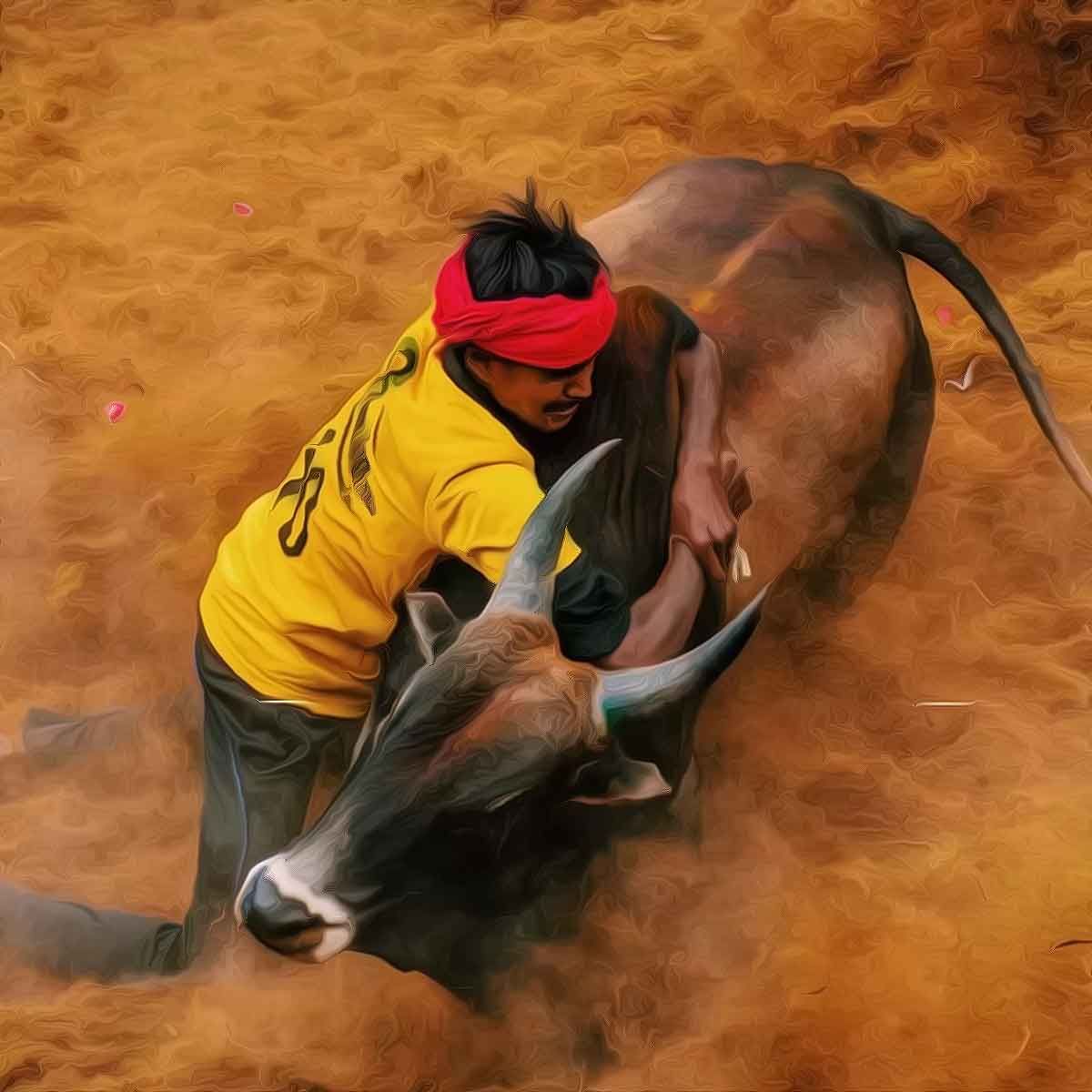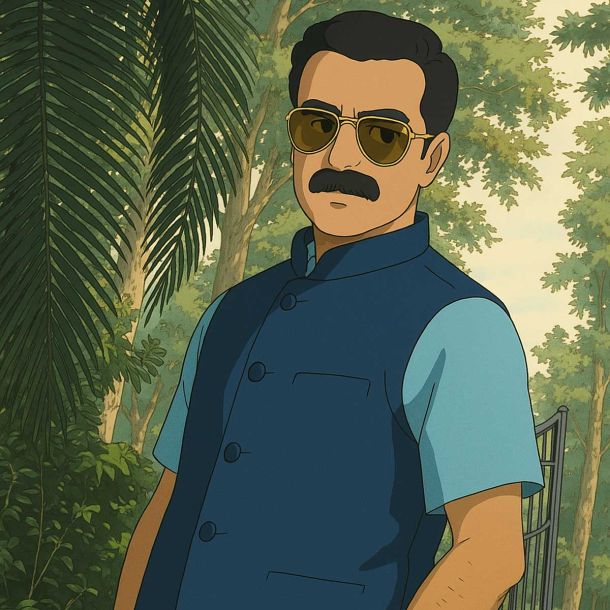More Coverage
Twitter Coverage
Satyaagrah
Written on
Satyaagrah
Written on
Satyaagrah
Written on
Satyaagrah
Written on
Satyaagrah
Written on
Join Satyaagrah Social Media
"Culture is the final wall, against which one leans one’s back in a godforsaken chaos": ‘Jallikattu’ is more than just a sport, its a cultural and customary tradition of Tamil Nadu aimed at preserving vitality & agile strength of the indigenous livestock

Imbibed in the culture of South India is the pride festival of Tamil Nadu, Jallikattu. Like all the festivals that pour magic in your holidays in Tamilnadu, the cultural festival of Jallikattu has its own authenticity. Celebrated in the month of January on the third day of Pongal festival, Jallikattu is a bull taming traditional sport played in villages of Tamilnadu. The sport is played in an open ground where a bull is let loose amid hordes of people who try to control the bull by piling on its hump or horns.
|
Tourists from all over the world travel to witness this festival as Tamils consider Jallikattu as a symbol of dignity of its outstanding culture and hence is engraved in the pages of Tamil history. With that being said, this popular festival of Tamilnadu has its special mention in Dravidian Literature as well and got its name from the tamil words 'jalli' which means gold or silver coins and 'kattu' meaning tied; which means that whoever tames the bull wins the silver or gold coins that are tied to the horns of the bull. Furthermore, the bulls that win in the festival are used for breeding and also bag the highest price in markets.
Possessed by the Tamil classical period, this traditional sport emerged in 400 BC -100 BC, and was enjoyed by the people who lived in the Mullai division of prehistoric Tamilnadu during that era. With passing time, to encourage people to participate in the festival a prize money was introduced and was given to those who showcased grit.Till date, the National Museum in New Delhi preserves the seal that belonged to the Indus Valley Civilization representing the sport.
And that's not all as there's even a white kaolin coloured cave painting that picturises a man attempting to control a bull was found near Madura and is believed to be 1500 years old. As for those who think every festival is linked with legends, there is a popular myth related to Jallikattu as well that revolves around how Lord Shiva asked his bull Basava to convey two messages which the bull ended up twisting and saying it the other way. It is said that Basava was asked to tell humans to take an oil bath daily and to consume food once a month for six months. Instead he conveyed them to consume food daily and take an oil bath once in a month. This chaos agitated the divine deity and he cursed the bull to help mankind in cultivating their fields.
|
Game of ‘Jallikattu’ is more than just a leisure recreation
Contrarily, some antagonists claim that the tradition is against the ethos and rights of animals. The view had been endorsed by the Supreme Court in the judgment of Animal Welfare Board of India vs. A. Nagaraja, whereby the court held that the tradition was in violation to rights of animals and amounted to cruelty.
Subsequently, the ban on the popular bull-taming sport was overturned by the Prevention of Cruelty to Animals (Tamil Nadu Amendment) Act of 2017 and the Prevention of Cruelty to Animals (Conduct of Jallikattu) Rules of 2017. The said amendments once again opened the gates for the continuation of the practice keeping in view the cultural and customary rights of the people.
|
Untested Dispute pertaining to Cultural rights of Tamils
The protagonists claim that the tradition of Jallikattu finds mention in Sangam manuscripts and is known to have been in practice throughout the Tamil classical period from 400 to 100 BCE. Therefore, the state government of Tamil Nadu had to come up with the amendments in 2017 to nullify the ban imposed by the 2014 verdict of the Supreme Court. As a consequence, further petitions were filed before the Apex Court challenging the validity of the impugned amendments.
Following which a 5-Judge Constitutional Bench was constituted by the Supreme Court to examine whether the 2017 Tamil Nadu state amendment can be protected under Article 29 as cultural right or whether the tradition amounted to direct contravention of A. Nagaraja judgment. However, the Constitutional Bench of the Supreme Court temporarily stalled the debate by reserving the judgment on the legality of the tradition of Jallikattu.
|
Arguments advanced in favor of Jallikattu
The Tamil Nadu government had been adamant with its stance in favor of Jallikattu as the tradition has been cherished since ages by the people of Tamil Nadu. During the arguments at the Apex Court, Senior advocate Mukul Rohatgi, appearing for Tamil Nadu, pointed out the threat to life of human beings and that of participating animals is part and parcel of every game.
The learned advocate asserted that in every field of activity, the threat to life persists, be it driving on the road or somebody doing something else. Therefore, mere apprehension of threat to the cultural rights of people cannot be curtailed.
Furthermore, on the issue that the sport is in contravention to the ban imposed by the Apex court in the 2014 judgment, the senior counsel contended that that the Nagaraja dictum does not lay down the correct law as the verdict proceeds on the biased premise that animals have rights, without taking into consideration the rights of people indulging in the sport.
Additionally, on the issue that ownership and participation of an animal for Jallikattu amounts to cruelty, Senior advocate Rakesh Dwivedi, appearing for the Tamil Nadu government, asked the court how killing an animal for food was not considered cruelty in the law.
He opined that it is not that we will not survive without mutton or fish, because Vegans do. Through the inquisitive enquiry he then went on to indicate that by killing for food, section 11(3)(e) of the PCA Act acknowledged that there are certain prevalent cultures where meat is a traditional part of the diet.
Various factors like climate, environment and habits have defined such cultures. Therefore, he said, a law cannot be brought in “suddenly to stop a long-prevailing habit”. Therefore, extending the logic, the senior counsel advocated that Jallikattu is an ancient game of Tamil Nadu with inherent rules, and all necessary regulations are in place to ensure that no unnecessary pain is inflicted on animals.
Further advocating the claims of the Tamil rights, Senior advocate Kapil Sibal, on behalf of the Government of Tamil Nadu, asserted that not every responsibility results in a concomitant right as a matter of law. The mere notion of holding Jallikattu a blood sport is based on a flawed premise that presumes that animals have a right to demand their well-being and the responsibility for the same is casted on humans. He heighted that no such right exists under the legal landscape of the nation, and a mere moral obligation lies on the humans to not cause unnecessary pain or suffering on animals.
Therefore, he argued that the interpretation in A. Nagaraja case was misconceived as Jallikattu under the amended laws has evolved, and with the present regulation in place, the precautions against cruelty to animals can be curtailed and consequently, the cultural rights of citizens cannot be abridged.
That is to say, the customary practice of Jallikattu is an intrinsic cultural right of the people of Tamil Nadu and the courts should abstain from playing with the sentiments of the people as animal rights are being curtailed throughout the globe on many counts. But specifically targeting Tamil culture is more of ‘eco-extortion’ guised under ‘judicial activism’ by vested interest groups.
References:
 Support Us
Support Us
Satyagraha was born from the heart of our land, with an undying aim to unveil the true essence of Bharat. It seeks to illuminate the hidden tales of our valiant freedom fighters and the rich chronicles that haven't yet sung their complete melody in the mainstream.
While platforms like NDTV and 'The Wire' effortlessly garner funds under the banner of safeguarding democracy, we at Satyagraha walk a different path. Our strength and resonance come from you. In this journey to weave a stronger Bharat, every little contribution amplifies our voice. Let's come together, contribute as you can, and champion the true spirit of our nation.
 |  |  |
| ICICI Bank of Satyaagrah | Razorpay Bank of Satyaagrah | PayPal Bank of Satyaagrah - For International Payments |
If all above doesn't work, then try the LINK below:
Please share the article on other platforms
DISCLAIMER: The author is solely responsible for the views expressed in this article. The author carries the responsibility for citing and/or licensing of images utilized within the text. The website also frequently uses non-commercial images for representational purposes only in line with the article. We are not responsible for the authenticity of such images. If some images have a copyright issue, we request the person/entity to contact us at This email address is being protected from spambots. You need JavaScript enabled to view it. and we will take the necessary actions to resolve the issue.
Related Articles
- Mob attacks Kalash Yatra taken out from Shiv Mandir located in Gautam Nagar, 8 injured and 25 arrested in Aarey Colony: Mumbai Police says ‘personal misunderstanding, slapped the sections of rioting and 307'
- Children got School sermons to not burst crackers on Diwali, this is how a mother responded
- “Everything happens for a reason. Sometimes the reason is you're stupid and make bad decisions”: Rs 200 fine, 6-month jail for bursting firecrackers - AAP’s Environment Minister, announced manufacturing, storing & selling firecrackers punishable offence
- "शेर-ए-संभल": In Sambhal, CO Anuj Chaudhary, an Arjuna Award-winning Olympian, ignited a storm by advising Muslims to avoid Jumma Namaz on Holi, March 14, drawing Yogi Adityanath’s support, while Ram Gopal Yadav threatened jail if SP wins
- Blanket ban on firecrackers by Calcutta HC, just ahead of Diwali: ‘Activist’ Roshni Ali filed PIL seeking ban
- For the first time in the history of Tirupati, 30 devotees on foot stopped from reaching temple for carrying musical instruments up Tirumala hill by TTD: Devotees perform Nama Sankeerthanam during the journey
- Comparing Holi with terrorism and reducing Navratri to ‘mating dance’ — how the Indian media has turned Hinduphobic
- 16-year-old Shivam has regained consciousness after five days in coma, he and his family took part in the Ram Navami celebration in Khargone when Islamists attacked: He had sustained significant brain damage
- “If we are to preserve culture we must continue to create it”: Bedara Vesha of Sirsi town is a unique folk dance with a legend of 300 years which is performed every alternate year to celebrate largest Holi festival of Karnataka, also known as Hunter Dance
- The forgotten temple village of Bharat: Maluti
- Far-left activist Yogendra Yadav's party leader Gulab Pasha demands to change the route or deny permission for Hindus to hold annual Annamma Devi procession: Claims it will disturb harmony between communities
- Aurangzeb banned Diwali 350 years ago, Courts and governments are just following Mughal ruler
- Jagannath Temple administration issues clarification on proposed sale of temple lands
- "Hindus were attacked but nobody came to rescue us, what's wrong with chanting 'Jai Shri Ram? Do we stay in Pakistan": Suresh Sarkar who created chariot for Jahangirpuri procession and was detained
- Left-liberal journalists attempt to whitewash Islamists' attack on Hanuman Jayanti procession of Hindus fall flat after Viral video shows the moment when the Shobha yatra was attacked first near a mosque in Jahangirpuri
























